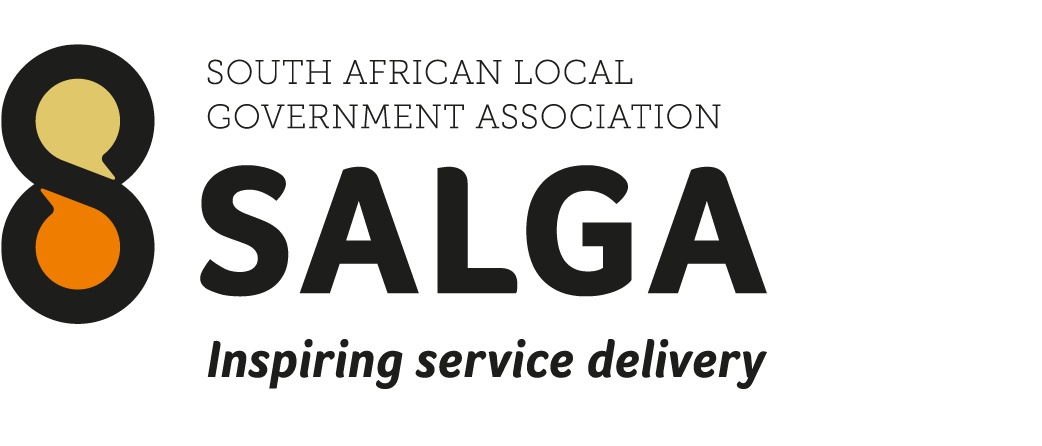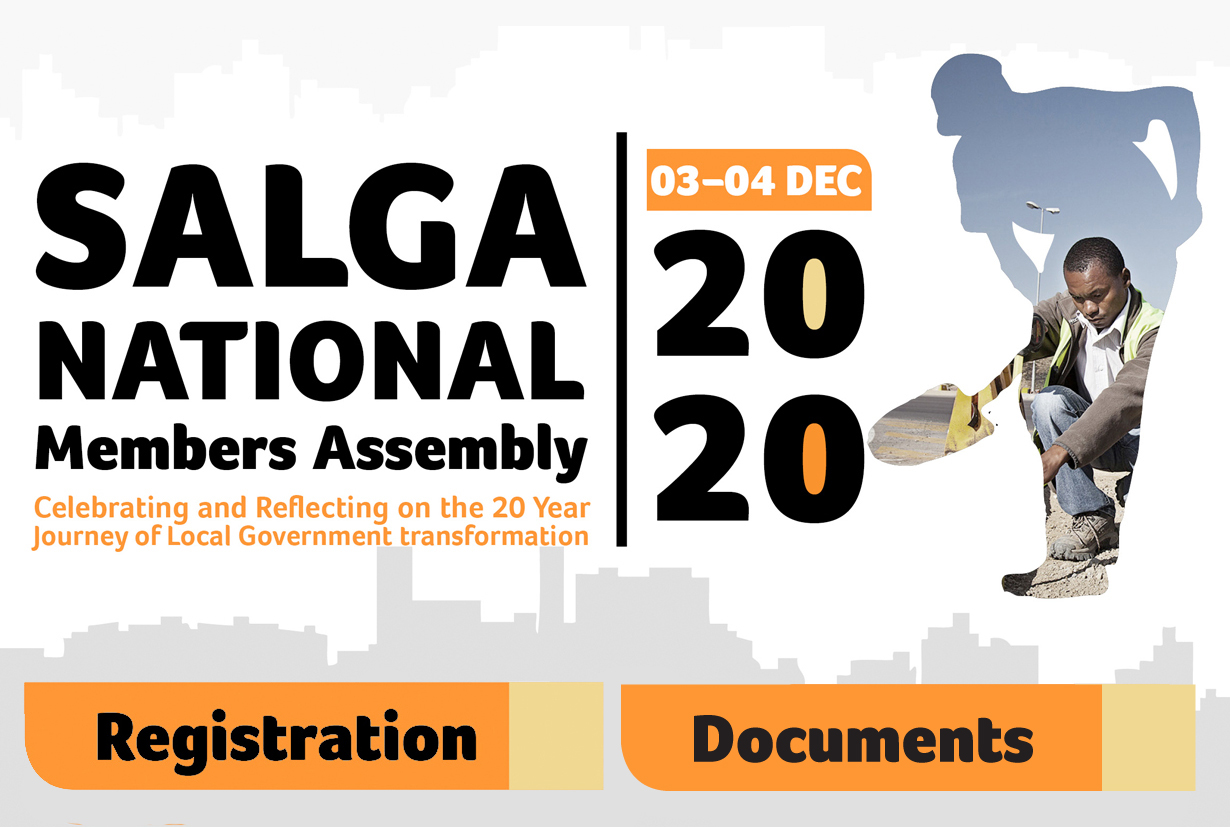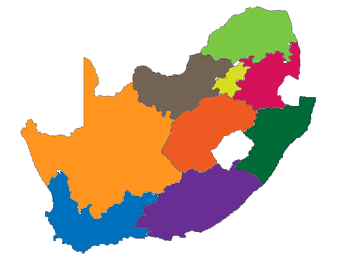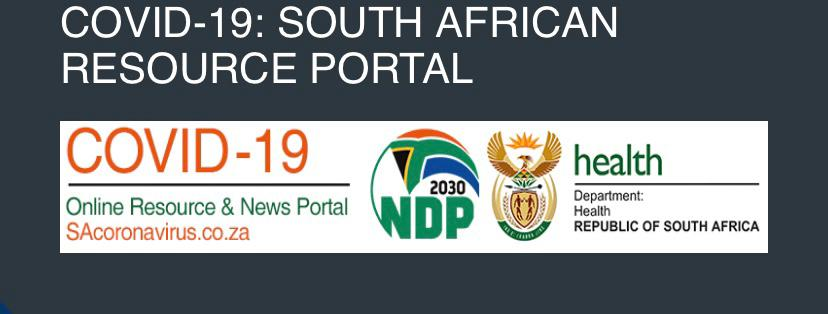
 |
 |
 |
 |
||||
 |
 |
 |
 |
 |
SALGA NEWS |
Upcoming Events |
 |

|
|

|
|

|
|
Annual Report |
 |
Quick Links |
 |
Municipalities |
 |

|
|
Social Media |
 |
Follow Us on Social Media
|
|
The South African Local Government Association (SALGA) special National Members Assembly (NMA) | Guiding the Transition: An opportunity to renew as we usher in the 5th Term of Democratic and People Centred Local Government
Posted: 24 May 2021
 |
Government, heads of chapter 9 institutions, civil society, the research community and other relevant stakeholders within local government, kicked-off the first leg of the two-day South African Local Government Association (SALGA) special National Members Assembly (NMA) on Thursday, 13 May 2021.
Convened by SALGA, the NMA, which ran from 13 to 14 May, complied with COVID-19 protocols as it took the form of a hybrid event with a limited number of delegates attending in person at the Radisson Blu Gautrain Hotel in Sandton, Johannesburg.
The event was held under the theme, “Guiding the Transition: An opportunity to renew as we usher in the 5th Term of Democratic and People-Centred Local Government.”
The NMA brought together stakeholders within local government and those related to the sector for engagement covering a wide range of local government topics with the aim of improving service delivery.
As the 4th term of democratic local government nears an end, the NMA, assessed preparations for the upcoming local government elections on October 27 and adopted a management and transition framework for the 5th term of democratic local government.
SALGA President Cllr. Thembi Nkadimeng delivered the opening address saying conversations at the two-day assembly should translate into practical action plans to strengthen municipal capacity and performance, which in turn will help improve service delivery outcomes over the next five years of local government.
“As we are all aware, the local government elections are scheduled to take place towards the end of October this year. It has therefore become necessary to prepare for the transition that municipalities will experience before, during and post the elections,” Cllr Nkadimeng said.
“Our intention therefore, commencing with this Special NMA, is to ensure the development of a comprehensive programme of guidance and support, in response to potential challenges that may be faced by municipalities during the transition.”
Cllr Nkadimeng also announced that the Statutory Affairs Committee of SALGA was tasked with the role of drafting governance and reputation management protocols that will guide the organization’s handling of National Executive Committee (NEC) and Provincial Executive Members (PEC) members facing serious allegations of impropriety and unethical conduct.
She added that the NMA would take these protocols a step closer to reality.
“The Committee has executed their mandate and presented recommendations to the NEC at our meeting held in February. We will therefore table these recommendations for the consideration of members during our Closed Session tomorrow morning,” said Cllr Nkadimeng.
Delivering the keynote address, Chairperson of the National Council of Provinces (NCOP) Hon. Amos Masondo, pointed out that many countries across the globe and international institutions
such as the United Nations (UN) regard South Africa as having one of the most progressive
Constitutions.
He said South Africa’s Constitution enjoys high acclaim for how it defines a constitutional democracy with a three-tier system of government and an independent judiciary.
“Under our Constitution, a municipality has the right to govern, on its initiative, the local government affairs of its community, subject to national and provincial legislation,” said Hon Masondo.
Following the opening session, the program for the NMA transitioned to panel discussions that triggered an exchange of ideas, collaboration and engagement on a broad range of topics in the field of local government.
Panel moderators Sakina Kamwendo and Clement Manyathela were tasked with the responsibility of keeping the conversations on track throughout the two-day event.
Panel discussion- A critical reflection on the 4th term of democratic local government.
SALGA President Cllr. Thembi Nkadimeng neatly outlined the role of SALGA, as the national membership body of South African municipalities, in supporting, promoting and improving local government in line with the organization’s mandate.
She honed in on SALGA’s efforts to improve the financial reporting quality and processes of their members’ municipalities across the country.
“Look at SALGA, 8 clean audits in a row. What are we trying to do now? We’re transferring what we are good at, adopting municipalities. With the limited resources we have, we’ll adopt 10 municipalities per financial year, and take our expertise as SALGA to municipalities to assist. We can’t be bystanders when we realize that there’s a problem,” said Cllr Nkadimeng
NCOP chairperson Hon. Amos Masondo, said that despite the numerous critical local governance challenges that needed immediate attention, local government has made meaningful progress in transforming the lives of the country’s black majority, who had been denied participation in political and economic life under apartheid.
“People who are saying that there’s nothing at all that has been done are removed from reality. If you open a tap, there’s water, there’s electricity. There may be problems about supply and outages, there are roads, rubbish gets picked up regularly,” said Hon. Masondo
“This is not to say that there are no problems, problems are there but we must not also deny the reality of things and progress that has been made since 1994.”
Prof Jaap de Visser, Director of the Dullah Omar Institute, University of the Western Cape (UWC), recommended political parties to improve their candidate selection lists ahead of the October 27 municipal elections, where councils for all district, metropolitan and local municipalities in each of the country’s nine provinces will be elected.
He argued that such mechanisms would sift the “opportunists” from the “real leaders”.
“Political parties would have to distinguish the opportunities from the real leaders,” Prof de Visser
said
“Political parties must ask themselves what should disqualify a person to run for election.”
Hon. Lechesa Tsenoli, Deputy Speaker of the National Assembly (NA) emphasized on the importance of SALGA’s Integrated Councillor Induction Programme (ICIP), which caters for newly elected and returning councillors with the aim of improving professional practice and institutional capacity in local government.
“SALGA often conducts induction programmes for councillors so that those are new are able to catch up fast and they learn from those who were there and equally they learn from others who have moved on to other spheres of government who can provide them with the perspective of the necessary intergovernmental relations that are a critical part of local government.”
Panel discussion- The state of readiness for the electoral transition
Thabo Manyoni, Municipal Demarcation Board (MDB) chairperson briefed the NMA on the delimitation of the municipal wards in preparation of the 2021 municipal elections.
Wards are delimited every five years in metropolitan and local municipalities for electoral purposes caused by changes in the number of registered voters as a result of migration and the enrolment of new voters on the voters’ roll.
As such, the delimitation process is a vital step towards the advancement of local democracy and promoting spatial transformation within communities.
“On the 1st of December 2020, the MDB handed 4 468 ward boundaries to the IEC to prepare for the Local Government Elections in 2021,” said Manyoni
Glen Mashinini, chairperson of the Independent Electoral Commission (IEC) updated the NMA
on the institution's state of readiness for the elections.
July 17-18 has been announced as the voter registration weekend for the local government elections taking place on October 27.
On these days all 23,146 voting stations around the country will open from 8am to 5pm to assist new voters to register and existing voters to check and, where necessary, update their registration details.
“The commission will be taking into cognizance the many uncertainties of the current environment, especially how COVID-19 is turning out. But up until we have received a scientific report and indications from Cogta and the department of health, we as the commission feel that we cannot deviate from what is expected of us by the Constitution. We have to discharge our duties accordingly.”
Representing the South Africa Police Service (SAPS), Maj General Nhlanhla Mkhwanazi also gave a status update on the SAPS’ safety and security state of readiness.
He expressed confidence that all safety and security measures have been put in place to create an environment for free and fair elections to take place and that hotspots in the country have been identified and will be prioritized.
“Historically, all previous elections have experienced challenges unique to the specific context during which those elections were held, but were declared to be free and fair,” said Maj General Mkhwanazi
Panel discussion- A reflection on the implications of legislation on the 5th term of local government
Senzo Mchunu, Minister of Public Service and Administration (DPSA) lamented that the growing distrust and poor image associated with the public sector continues.
He said public sector workers and government officials needed to obtain the requisite skills and qualifications to perform their duties and also desist from corrupt practices.
“In the public service you are expected to produce an assessment for something, only to find out that you are not trained for the purpose. Yes, you have an education but you still need to be trained in such a way that your training is tailor made to produce high productivity in what you are now occupying.
“That’s the only way that we can make strides in the march towards a developmental state and it does not end there. We need to train public servants to resist corruption,” says Minister Mchunu
Cllr. Xola Pakati, Executive Mayor of Buffalo City Metropolitan Municipality said of efforts underway to professionalize the public service: “Since 2019 we have been engaging in the establishment of an office conducting standards and compliance and the issue of doing business with the state, the disclosure of financial interests.”
Cllr Bheke Stofile, Speaker of Matjhabeng Local Municipality and SALGA NEC member, said of the discussion: “We’ve always been engaging in the interest to see the sector being professionalized. Part of this professionalization of the sector is to accept that certain things happening in the sector which are wrong had to be dealt with. That is why we firmly participated in the amendment of the Municipal systems Bill that is before Parliament today.”
End of day 1.
Day 2- SALGA NMA, 14 May.
Inspiring speeches and lively debates were yet again heard at the second and final day of the special NMA, held by SALGA.
Delegates continued to share their views on a wide range of local government topics with the aim of translating discussions into actionable strategies to improve citizens' perceptions and experiences of local government in South Africa.
Panel discussion- Managing the transition
Hon. Nkosinathi Mthethwa, Minister of Sports, Arts and Culture, spoke about the transformation of South Africa’s heritage landscape.
He emphasized that to build a truly non-racial, non-sexist, democratic and prosperous society, processes of removing the vestiges of colonialism and apartheid racism were important.
He also spoke on how certain monuments, symbols, signage’s and statues in public spaces carried a history of oppression and tyranny and that it was important for South Africans to begin having conversations on what their role should be in a democratic dispensation.
“Do we create a concentration camp of unwanted statues with a narrative or do we leave it to those who still value them to preserve them thus running a risk of reigniting old right wing nationalism by privatizing public property, do we allow for juxtaposition of these statues as it is the case in the Union Building where President Mandela is given prominence and centrality while Hertzog was moved to a less prominent space?” Hon Mthethwa asked.
Hon. Dr Nkosazana Dlamini-Zuma, Minister of Cooperative Governance and Traditional Affairs (COGTA) spoke about the feasibility of conducting free and fair elections under the shadow of the COVID-19 pandemic.
She emphasized that while the country was ready to hold elections in October, several other considerations, including the legal, socio-political, health and practical would also be assessed.
“We will have to look at the way it goes and clearly in August we have to make an assessment on whether the election is possible in October depending on where we are. If we look at the second wave (COVID-19), it started in November but by March we were not in the second wave, so it depends on how long the third wave remains with us,” said Hon Dlamini-Zuma
“The considerations will be determined by the infection (rate), but August is still far from here, it may be that we will be over the third wave by then when the election date has been gazetted but if not, there will be consideration on whether we can have elections and if the answer is that we can’t because of the pandemic, then we will have to consider going to the Constitutional Court to ask for an extension because the 27th of October is actually the last constitutionally accepted day we can have elections.”
Panel discussion- Managing key aspects of the transition
SALGA Chief of Operations (COO) Lance Joel, among others, outlined the process of once-off gratuity payments to non-returning councillors.
Joel explained that the payments, which would be based on the pensionable salary of each non- returning councillor, would be preceded by strict screening which includes checking tax states of individual councillors with SARS.
He added that the purpose of these payments are meant to provide financial relief to non-returning councillors so that they can adjust at a time where they are no longer in the public office, and to assist them to meet their financial obligations.
It was indicated that a total of R139 million was paid to eligible recipients from 2011 to 2014 with more than 4000 applications having been received. In 2016/17, more than 5,500 individual applications were screened and a total of R274 million was paid.
For 2021, a request for funding to the National Treasury was made and R350 Million has been set aside – still based on 3-month salary.
Rio Nolutshungu, Chief Officer: Municipal Capabilities and Governance at SALGA, outlined some critical elements of the SALGA Transition Management Plan (TMP) for the 5th term of democratic local government, including SALGA’s Integrated Councillor Induction Programme.
He explained among others, that the purpose of the induction programme is to help ensure that new councillors understand their duties and responsibilities in the field of municipal governance, that they understand local government policies and procedures and to equip them with the skills and knowledge needed to undertake their role as a councillor.
“The 2016 Integrated Councillor Induction Programme (ICIP) appreciated the journey of councillor induction as a first step in a series of learning interventions which was best expressed via the Inductive Learning Pathway diagram. The purpose of the model is to
assist councillors with identifying developmental areas to enhance their leadership and governance competencies,” said Nolutshungu.
Elias Msiza, from the Municipal Councillor Pension Fund (MCPF), explained the role of the Fund, saying it was established in May 1988 in terms of the Pension Benefits for Local Authorities Act
105, 1987 in order to service the retirement needs of Municipal Councillors.
He explained the various benefits are offered by the Fund to its members, which include housing loans, funeral and death benefits among others.
With an active membership of 5447, Msiza said that as of 31 March, 2021, the value of the asset fund stood at over R241 billion.
Following this session, the NMA declaration was adopted and can be accessed here: http://www.salga.org.za/event/nma21/documents/Special%20NMA%20Declaration.pdf.
SALGA President, Cllr Thembi Nkadimeng, subsequently brought the NMA to a close, saying she was confident that the discussions emanating from the NMA would translate into actionable strategies to improve service delivery outcomes over the next five years of local government.
“This Special NMA has witnessed an unprecedented and major convergence of views that is ground breaking for local government. Despite the complexity of using this Hybrid format of engagement from a content perspective we all agree that we must not only adopt and embrace the Special NMA Declaration, but also take bold and proactive steps to implement and accelerate it.”
